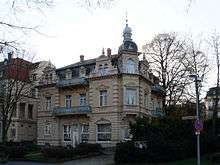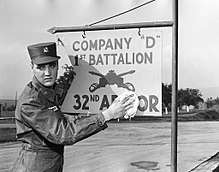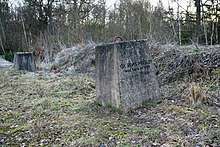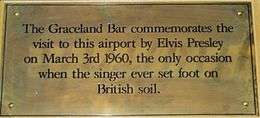Military career of Elvis Presley
Elvis Presley served in the United States Army between March 1958 and March 1960. At the time of his draft he was the most well-known name in the world of entertainment.
Elvis Presley | |
|---|---|
 Elvis Presley poses for the camera during his military service at a US base in Germany | |
| Birth name | Elvis Aron Presley |
| Born | January 8, 1935 Tupelo, Mississippi, U.S. |
| Died | August 16, 1977 (aged 42) Memphis, Tennessee, U.S. |
| Allegiance | |
| Service/ | |
| Years of service | 1958–1960 |
| Rank | |
| Unit | |
| Awards | Army Good Conduct Medal |
Before entering the U.S. Army, Presley had caused national outrage with his rock and roll music. Many parents, religious leaders, and teachers groups saw his draft as a positive thing. Despite being offered the chance to enlist in Special Services to entertain the troops and live in priority housing, Presley decided to serve as a regular soldier. This earned him the respect of many of his fellow soldiers and people back home who previously viewed him in a negative light.
During his service, Presley's life was affected in many ways, beginning with the death of his mother. Not long before he was to be stationed in Germany,[1] Gladys Presley died of a heart attack brought on by acute hepatitis and cirrhosis at age 46. When he was stationed in West Germany, he met his future wife Priscilla Beaulieu and became dependent on stimulants and barbiturates. This unhealthy addiction eventually led to his divorce, and ultimately his death at age 42 in 1977.[2]
After his release from military service, Presley found a new fan base among an older age group, thanks in part to his army career and releases of ballads over rock and roll songs.
Pre-induction
Draft
On January 8, 1956, Presley turned twenty-one years old. Like most American men of that age, he was now eligible to be drafted. Colonel Tom Parker, Presley's manager, was well aware of his client's draft status and how it could affect his career.[3] In the summer of 1956, Parker wrote to the Pentagon requesting that Presley be considered for Special Services. Special Services would allow Presley to do only six weeks basic training and then resume life as normal with the exception of performing several times a year for the armed forces.[3] However, Parker had no intentions of allowing his client to ever sign up for Special Services. Special Services would require Presley to perform for free, with each performance being recorded and filmed for sale to television stations throughout the world. Only the armed forces would profit from these recordings, and Parker was in no way willing to allow anyone, even "Uncle Sam", to enjoy Presley's talents for free.[3] Over the course of the next twelve months Parker led Presley to believe that it was still possible to avoid the draft completely.[3] Unknown to Presley, Parker had no intention of avoiding the draft. In his eyes, after a year of some negative publicity about Presley, this was the perfect opportunity to change the view that older America had of him.[3] Parker explained to Presley that this was a situation neither of them could refuse. When Presley was told that he would have to serve as a regular soldier he was furious; he was angry that his manager was not able to find a way out of the draft. Parker promised Presley that if he worked hard and served as a regular GI for two years, he would return "a bigger star" than when he left.[3]
On January 4, 1957, Presley attended Kennedy Veterans Hospital in Memphis for a pre-induction army medical. On January 8, Presley's twenty-second birthday, he was declared 1-A by the Memphis Draft Board; physically fit and likely to be drafted some time in the next eight months. It was on December 16 that it was officially announced that Presley would be receiving his draft notice. While fans around the country were upset about the news, parents and teachers groups were ecstatic. Presley had been, in their opinion, a menace to society.[4]
The Navy offered to create a special Elvis Presley Company made up of men from Memphis and Presley's closest friends. They also offered him the chance to perform in Las Vegas, and have his own private quarters.[4] The Army offered Presley the chance to tour the world and visit army bases to boost morale among soldiers and encourage other young men to enlist. Presley politely told both parties that he would consider their offers.[4] The Pentagon, too, had been in touch to offer Presley the opportunity to join Special Services, entertaining the troops without having to actually train as a regular soldier; among many soldiers and veterans it is known as "the celebrity wimp-out".[4] After discussing each possibility with Parker, Presley decided to join up as a regular soldier. In Parker's words, "Taking any of these deals will make millions of Americans angry".[4]
King Creole extension
Presley was originally scheduled to be inducted on January 20, 1958. However, due to commitments at Paramount and the filming schedule of his latest film, King Creole, Presley had to personally write to the Memphis Draft Board to request a deferment. He explained to them that Paramount had already spent up to $350,000 on pre-production of the film, and that many jobs were dependent on him being able to complete filming, which was due to begin on January 13. They granted him an extension until the middle of March. When news of the extension broke, angry letters were sent to the Memphis Draft Board complaining about the "special treatment" that Presley was receiving. According to Milton Bowers, head of the draft board and angered by the public outcry, Presley "would have automatically gotten the extension [anyway] if he hadn't been Elvis Presley the superstar".[4]
Worried that rock and roll music was a passing "fad", Presley wanted to make King Creole the best role he had ever acted.[3] He knew that two years out of the limelight would mean hard work when he returned, and so he gave his all in that film to show the world that he had the potential to return as a serious, dramatic actor. Author Alanna Nash described it as "the performance that would forever define his potential".[3]
Army life
Induction

Two weeks after finishing King Creole, Presley reported for his induction on March 24, 1958, a day dubbed "black Monday" for his fans by the press.[5] Presley was given a physical and assigned army serial number 53310761, before being sworn in and made leader of his group. Parker, with the permission of the army, had arranged for news crews from around the world to be on hand to report Presley's entry into the army. After his final goodbyes to family and friends, Presley and his fellow recruits were taken by bus to Fort Chaffee, Arkansas.[6]
Fort Hood
Presley spent four days at Fort Chaffee before being transferred to Fort Hood in Texas.[5] After being assigned to Company A of the Third Armored Division's 1st Medium Tank Battalion, Presley completed basic training by June. He had become a pistol sharpshooter, and expressed his enjoyment at the "rough and tumble" of the tanks obstacle course.[5] To friends back home, however, he was less upbeat. In letters to friend Alan Fortas, Presley described his homesickness and insisted that he hated the training.[5] Eddie Fadal, another of Presley's friends, remembers that Presley would worry about his career, fearing it was all over. One of Presley's instructors, Bill Norwood, who let Presley use his phone to call home on many occasions, recalls Presley breaking down in tears during many of these phone calls.[5]
After a short break to record new material for RCA Victor in June, Presley returned to Fort Hood to finish his tank training. He was now living off post, in his own house, with his mother, father, grandmother, and friend Lamar Fike; soldiers who had dependents living off post were allowed to live with them.[5] Having his family close by cheered him up immensely, although he still spoke to friends about his fears for his career. Parker, who was often a visitor to Presley's home, would attempt to reassure his client. Parker had arranged for enough material and merchandise to be available to keep Presley's name in the public arena during his two years in the service. Although Presley nodded along in agreement with his manager, he was not really convinced that he could return to what he had known previously.[5][6]
Mother's death
In early August, while in Texas with her son, Gladys took ill.[7] She had recently increased her alcohol intake to cope with her son's fame and army commitments, and she had also begun using diet pills to attempt to lose weight. This, coupled with a bad diet, had led to the deterioration of her liver. One afternoon, after a heated argument with her husband Vernon, Gladys collapsed from exhaustion. Presley arranged for her and Vernon to return to Memphis on August 8.[7] The next day Gladys' condition worsened so rapidly that she was rushed to a hospital. On August 11, after calls from her doctor, Presley requested emergency leave to visit with his mother. After initially being turned down and threatening to go AWOL, Presley was eventually given permission to leave on August 12.[7] The officer who initially denied Presley his emergency leave was later disciplined for his actions.[8]
On August 14, Gladys died from cirrhosis. The official cause of death was listed as heart attack, but the Presleys refused an autopsy to verify it. Presley and Vernon were both devastated by her death. Her funeral was held on August 15, and Presley collapsed several times before, during, and after the service. His mother had always been the most important person in his life, and now he felt as though everything he had worked for had been for nothing. Presley's leave was extended by five days on August 18, and when he finally left to return to Fort Hood he left instructions that nothing in his mother's room was to be altered.[7]
Life in Germany
1958

After training at Fort Hood, Presley was assigned to the 3rd Armored Division in Friedberg, West Germany.[5] He left Fort Hood on September 19, headed for Brooklyn Army Terminal in New York where he and his division would ship out to West Germany on September 22. After a short press conference arranged by Parker, which also involved Presley walking up and down the plank of the USS General George M. Randall eight times for cameras, the ship set sail and Presley would spend the rest of his service overseas.
During the crossing Presley became a friend of a fellow soldier named Charlie Hodge.[5] Hodge, who had enjoyed some success as an entertainer himself before being drafted, encouraged Presley to help him put together a show for the troops. Presley accepted his request, but only agreed to play piano in the background; Parker had drilled into him that there would be no public performances of any kind during his service.[5] Hodge would become such a close friend to Presley during their time in the army that he was invited to work for him when they were both discharged.
On October 1 the USS General George M. Randall (AP-115) arrived in West Germany and Presley was once again offered the chance to join Special Services. Again he politely refused, and was instead given the task of driving the commanding officer of Company D, Captain Russell.[5] Russell, however, did not take to the attention surrounding Presley, and he was transferred to driving duties for Reconnaissance Platoon Sergeant Ira Jones of Company C.[5]

Shortly after arriving in West Germany, Presley was allowed to live off post. He and his family moved into Hilberts Parkhotel in Bad Homburg then to the Grunewald Hotel in Bad Nauheim, a town even closer to Friedberg, a city hosting the HQ of Ray Barracks. In the meantime, from the United States, Parker wrote on a nearly daily basis to Presley about how things were going back home. He had acquired deals with RCA and 20th Century Fox to make sure Presley's return to public life would go as smoothly as possible. RCA agreed to release an album of Presley's press conference the day he left for West Germany; titled Elvis Sails, the album would pay Presley $0.22 per sale in royalties, guaranteed up to at least 100,000 copies.[9] 20th Century Fox had agreed upon a $200,000 fee for one Presley film, with options on a second for $250,000 and a 50/50 split on profits.[9] Paramount, too, had signed deals to produce a number of new Presley films after his release; what would eventually become G.I. Blues was agreed upon for $175,000 and a three-picture option was also included.[10] Parker also reassured his client about the press coverage he was receiving while overseas. News outlets were reporting regularly on stories, mostly released by Parker himself, about plans for Presley's return to entertainment. Stories of wild parties in Presley's hotel room were also making it into the papers regularly, and Parker was forced to hold a press conference to dispel these rumors. For Presley, however, being away in West Germany was not all happy times. He would often write home to friends and family about how homesick he was, how desperately he missed his mother, and of how his fears about his career still clouded his mind.[9]
Introduced to amphetamines by a sergeant while on maneuvers, he became "practically evangelical about their benefits"—not only for energy, but for "strength" and weight loss, as well—and many of his friends in the outfit joined him in indulging.[11] The army also introduced Presley to karate, which he studied seriously, later including it in his live performances. Fellow soldiers have attested to Presley's wish to be seen as an able, ordinary soldier, despite his fame, and to his generosity while in the service. He donated his army pay to charity, purchased TV sets for the post, and bought an extra set of fatigues for everyone in his outfit.[12]
1959


In early 1959, after a combination of a few complaints from other guests about the behavior of Presley fans wanting to see him at the Grunewald Hotel and the arrival of King Saud of Saudi Arabia, whose rather large entourage demanded the closing of the entire facility so that they could be well taken care of, particularly as his stay there was for medical reasons, Elvis and the group left the hotel and moved to a five-bedroom house nearby, at #14 Goethestrasse, soon to become the then West Germany's most celebrated private address.[13] Fans would congregate outside the house to see Presley as he came and went to work, and a sign was put up stating that autographs would be given between 7:30 and 8:00pm.[13]
Although Presley's manager had forbidden him from performing while in the army, pressure from RCA for him to record new material led to Parker sending a microphone and a tape recorder to West Germany. Presley had recorded a handful of songs before he left for West Germany to cover his time away, but RCA was worried that they would run out of material before March 1960. In a letter to his client, Parker explained that recordings of Presley with just a piano for accompaniment, singing gospel songs would be good enough; his fans would just want to hear him sing anything.[13] Presley used the recorder to mess around with friends and family, singing mainly gospel and current hits, but none of these recordings were sent back for release by RCA. Decades later these recordings would be released officially on titles such as Private Presley and Home Recordings. In June, with 15 days' leave to enjoy, Presley and his friends traveled to Munich and Paris.[13] Two days in Munich were followed by over a week of partying in Paris where, on several occasions, Presley would invite the whole chorus line of girls from The 4 O'Clock club back to his hotel.[14]
Dee Stanley
Around this time Presley's father, Vernon, had been getting close to a woman named Dee Stanley, the wife of army sergeant Bill Stanley.[15] Originally Dee had written to Presley inviting him to dinner. She had seen him live during one of his earliest performances in the fifties, and she was keen to meet a star of his stature. Presley, not interested in dinner with someone he knew was considerably older, sent his father in his place.[16] Most biographers state that Dee was already in the process of divorcing her husband when she met Vernon, but some others claim that Vernon had gotten to know both of them together, and was even asked by Bill to help him save his marriage.[16] When Presley heard of the relationship between his father and Dee he flew into a rage; in his mind his father had no business to be setting up with another woman so soon after the death of Gladys.[16] Dee returned to the US in the summer of 1959, closely followed by Vernon, and the pair returned to West Germany together.[16] Close friends of Presley have stated that Bill received a "handsome payoff" for his signature on the divorce papers.[16] Dee and Vernon eventually married in 1960, with her children becoming stepbrothers to Presley. Although Presley never liked Dee, he became very close to her young children and welcomed them to his home as the brothers he never had; in later years they were employed as bodyguards and drivers.[16] Dee Stanley Presley died on September 28, 2013.[17]
Elvis meets Priscilla
On September 13, airman Currie Grant, who had met Presley a couple of months earlier, introduced him to 14-year-old Priscilla Beaulieu during a party at Bob's home.[13] Witnesses recall that Presley took an instant liking to Priscilla, and the pair were practically inseparable during the rest of his time in West Germany. They would eventually marry after a seven-and-a-half-year courtship.[18] In her autobiography, Priscilla says that despite his worries that it would ruin his career, Parker convinced Presley that to gain popular respect, he should serve his country as a regular soldier rather than in Special Services, where he would have been able to give some musical performances and stay in touch with the public.[19]
Media reports echoed Presley's concerns about his career, but RCA producer Steve Sholes and Freddy Bienstock of Hill and Range had carefully prepared for his two-year hiatus. Armed with a substantial amount of unreleased material, they kept up a regular stream of successful releases.[20] Between his induction and discharge, Presley had ten top 40 hits, including "Wear My Ring Around Your Neck", the best-selling "Hard Headed Woman", and "One Night" in 1958, and "(Now and Then There's) A Fool Such as I" and the number one "A Big Hunk o' Love" in 1959.[21] RCA also managed to generate four albums compiling old material during this period, most successfully Elvis' Golden Records (1958), which hit number three on the LP chart.
Discharge

On January 20, 1960, Presley was promoted to sergeant.[22] The army held a press conference on March 1 before Presley departed from West Germany. Presley was asked about his decision to serve as a regular soldier instead of as part of the service club. He said, "I was in a funny position. Actually, that's the only way it could be. People were expecting me to mess up, to goof up in one way or another. They thought I couldn't take it and so forth, and I was determined to go to any limits to prove otherwise, not only to the people who were wondering, but to myself".
On March 2, with Priscilla in attendance, Presley waved goodbye to the fans and media of Germany and flew home to the U.S. En route, his plane stopped at Prestwick Airport in Scotland to refuel; this was the one and only time that Presley would set foot in the United Kingdom. On March 3, Presley's plane arrived at McGuire Air Force Base near Fort Dix, New Jersey, at 7:42 am. Nancy Sinatra, RCA representatives, and Parker were there to welcome him home, as well as a huge crowd of fans. Two days later, on March 5, Presley was officially discharged from active duty with his service officially notated as Honorable.
Awards
![]()
Upon completion of his service Presley was awarded the Army Good Conduct Medal. He also qualified as an expert marksman with several weapons.
References
- "Vernon and Gladys Presley : Elvis Presley's Mother and Father". Elvis Australia. January 24, 2015.
- Gaar, Gillian G. "Ernst Jorgensen: Chronicler of Elvis' Life." Goldmine 26.1 (2000): 21. International Index to Music Periodicals Full Text [ProQuest]. Web. September 27, 2016
- Nash, Alanna (2003). The Colonel. Aurum. pp. 174–180.
- Brown, Peter Harry; Broeske, Pat H. (1997). Down at the End of Lonely Street: Life and Death of Elvis Presley. Arrow Books Ltd. pp. 131–138. ISBN 978-0-7493-2319-6.
- Victor, Adam (2008). The Elvis Encyclopedia. Gerald Duckworth & Co Ltd. pp. 23–27. ISBN 978-0-7156-3816-3.
- Elvis: His Life from A to Z. Outlet. 1992. p. 8. ISBN 978-0-517-06634-8.
- Elvis Day by Day. Ballantine Books Inc. 1999. pp. 123–124. ISBN 978-0-345-42089-3.
- Brown, Peter Harry; Broeske, Pat H. (1997). Down at the End of Lonely Street: Life and Death of Elvis Presley. Arrow Books Ltd. p. 161. ISBN 978-0-7493-2319-6.
- Elvis Day by Day, pp. 127–130
- Nash, Alanna (2003). The Colonel. Aurum. p. 183.
- Brown, Peter Harry; Broeske, Pat H. (1997). Down at the End of Lonely Street: Life and Death of Elvis Presley. Arrow Books Ltd. p. 179. ISBN 978-0-7493-2319-6.
- Clayton & Heard 2003, p. 160.
- Elvis Day by Day. 1999. pp. 132–140.
- Elvis: His Life from A To Z, p. 117
- Elvis: His Life from A To Z, p. 187
- The Elvis Encyclopedia, p. 498–499
- Davison, Phil (November 6, 2013). "Dee Stanley Presley: Elvis' stepmother, who enraged the singer". The Independent. Retrieved June 9, 2014.
- Victor 2008, p. 415.
- Presley 1985, p. 40.
- Jorgensen 1998, p. 107.
- Whitburn 2004, p. 501.
- Guralnick, Peter (November 3, 2008). Careless Love: The Unmaking of Elvis Presley. Paw Prints. p. 49. ISBN 978-1-4395-6898-9.
Bibliography
| Wikimedia Commons has media related to Elvis Presley in Germany. |
- Clayton, Dick; Heard, James. Elvis: By Those Who Knew Him Best. Virgin Publishing; 2003. ISBN 0-7535-0835-4.
- Jorgensen, Ernst. Elvis Presley—A Life in Music: The Complete Recording Sessions. St Martin's Press; 1998. ISBN 0-312-18572-3.
- Presley, Priscilla. Elvis and Me. G.P. Putnam's Sons; 1985. ISBN 0-399-12984-7.
- Victor, Adam. The Elvis Encyclopedia. Overlook Duckworth; 2008. ISBN 1-58567-598-9.
- Whitburn, Joel. The Billboard Book of Top 40 Hits. 8th ed. Billboard Books; 2004. ISBN 0-8230-7499-4.